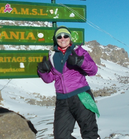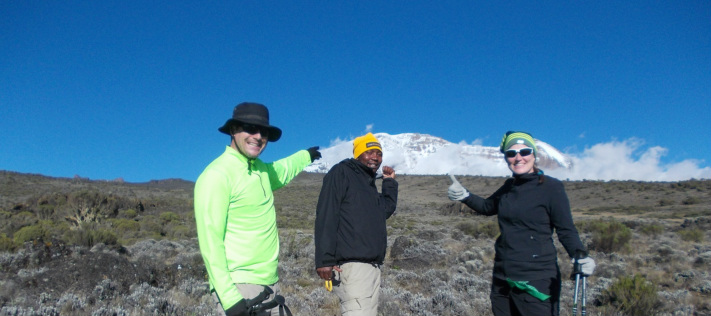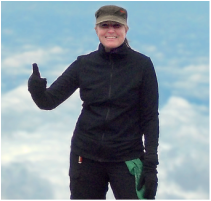|
The first time I climbed Kilimanjaro I went with my sister, Carrie. Carrie is a uberplanner. And because I figured she'd have most things covered, I didn't really worry about doing much research. A few weeks before we left, I did start to watch a YouTube video about how to pack for Kilimanjaro but then I got caught up in a weird YouTube related video string and ended up watching a botfly get removed from some poor bastard who visited Bolivia. Bottom line I learned from that little internet search: Don't go to Bolivia. And - YouTube is awesome. So my learning curve was steep when I arrived on the mountain (steep - get it??? steep .. like the mountain is steep. Umkay, moving on). And I had to learn some things the old trial and error way. Which is okay and truthfully, the way I learn best. In fact, even if I'd read ahead, I'm not sure I would have listened. I'm not really known for compliance. Or even comprehension. So reading ahead may not have helped me when, say, I pee'd all over my pants on day 1. But maybe you aren't like me. Maybe you are more like my sister - who never once pee'd on herself or her pants the whole trip - and you'd like to know some hints. I'm down with that. Here's what I've got: Lesson One: Pole pole. As you climb Kilimanjaro, if you pay attention at all, you will learn a handful of Kiswahili words. One of those words is "pole pole". I know, it looks like two words. It isn't. Not really. Two "poles" - "Pole pole" means something completely different than just one "pole". Kinda like two back-to-back shots of tequila mean something totally different than one. And "pole pole" isn't pronounced like you think. It's not "pole" like a stick in the ground or the thing you use to vault. It's pronounced "poe-lay poe-lay", like you're pointing out a couple of Edgar Allen's girlfriends. "Pole pole" simply means, "slowly". If, unlike me, you've done any reading about Kilimanjaro at all, you've probably already know about going slowly. It's one of the first things people tell you. Easy does it. The slow way is the only way. The tortoise beats the hare. Blah blah blah. And I know you *think* you know what slowly means. But you don't. Not really. Slowly on the mountain is not like normal slowly. Slowly on the mountain is like the gear before you get to first gear. It's like idle, on a bike, on an incline. I'm talking SLOW. Why go slowly? Since I don't think "because I said so" will work, I will give you the actual reason. It's pretty technical. Try to keep up. Ready? Here's it is: Because if you don't, you'll crap out. (That's a climbing term you may not be familiar with. In layman's it means "get ready to pay for some hotel rooms at the base of the mountain cause you aint seein' the top. Brother.") The bottom line? Your body isn't used to altitude - and it takes time to get used to it. It needs you to go slowly so it can adjust. It can, I promise. But it takes time. Your body needs you to slow-the-jack down so it can physically adjust to the changes you're asking it to make. If you rush it, you're not going to like it. It's sort of like having sex the first time - it's not a complicated process but maybe let's not try to get it done during a commercial break of Dancing with the Stars. I just realized this analogy only works if you're female. If you'd like a more technical explanation of how your body adjusts to altitude, you can find it here. I'm assuming it is accurate. Truthfully, I didn't read the whole thing. Mostly because I scanned it and there didn't seem to be any botfly extractions anywhere on the page. For myself, I thought going slowly wouldn't be a problem. Having completed a handful of marathons and a couple of IRONMANs, I know the importance of pacing. I'm well acquainted with how important "take it easy and save it" can be. I've had to learn to dial it back and let the race come to me. Actually that's not really true. I go slowly because I really suck at running. In marathons, Ironmans, half-ironmans, olympic distance triathlons, 10Ks and 1 mile fun runs I go slowly because I don't really have a choice. That's my speed - None miles per hour. But, as it turns out, I'M SO GOOD AT WALKING! and that's what Kili is - a walk. And since I'M SO GOOD AT WALKING - I wanted to go faster ... because it was hard. Walking on Kili is hard. It's uphill (which shouldn't be a surprise to you) and it's rocky and there isn't a lot of that stuff, what's it called again? Oh yeah - air. So walking Kili is hard and when something is hard I just want to get it over with already! So maybe I pushed a little on that first day. Thankfully, I had a guide that was smart enough to recognize I was going too fast and gently reminded me of the importance of "pole pole". He gently reminded me by saying "Jenne, do not ever walk in front of me again. You stay. Here. (:::points to area behind him:::) Behind me." Got it. Direct and to the point. All clear. Roger that. So we went slowly. And we reached the top. That should be enough to convince you. If it isn't, think about this: what's the rush? Why not go slowly? Slowly is good. Slowly is great, in fact. Slowly allows for observation, reflection, enjoyment. Each day you have ONE thing to do. Just one. Get to the next camp. That's it. When you get there, your tent will be set up, your dinner will be prepared, your hot water for washing will be waiting. All you have to do is get to the camp. That's your one and only job. So chill. Downshift. The mountain isn't going anywhere. This mountain, this highest free-standing mountain in the world, has been here a long time - years, centuries, millennia - it's been keeping watch over the rainforest below, over the prowling lions and migrating wildebeests, over the nomadic Masaai and the banana-farming Chagga. It's grown trees so massive they rival buildings in any American city. It's crashed and tossed boulders the size of minivans half-way down it's slopes. It's seen the dawn of centuries, the dawn of progress, and the dawn of man. It's been there a very long time. But you won't be. You will be on Kili basking in her hospitality and wonders for a very short time. She will amaze you with her beauty and terrify you with her harshness. She will rock you to sleep under an ocean of stars. Like a Geisha, she will peek out at you from behind a thick wrap of clouds only occasionally to show you her beauty and then quickly hide behind that curtain again - closing a cloudy kimono. She will reset your previous beliefs about what's possible and what's comfortable and your very western view of showers and the need for flossing. She will make you cry, she will make you laugh, she will silence your voice while your heart babbles on and on in an ancient language translated through gasps and exhales. She will thrill you. She will seduce you. She will enrapture you. And then you will be gone. You will swear you will remember her lessons. You will close your fist around the memories and pledge to never let them go. You will say, "I will remember" and "I won't forget". And you will mean it. But. You will forget. You won't remember. Your life will crash in around you. Your flight will get canceled. Your kid will spill milk on the car rug and not tell you. Your dentist will call to schedule your cleaning. Your house gutter will fall off in a storm and need fixing. Your check engine light will spotlight out on your dashboard when YOU JUST HAD THAT FIXED LAST WEEK! and you will forget. Because that's life. But Kili is living. So go slowly. Don't rush. Breathe in. Breathe out. And climb. Pole pole.  Jenne Fromm is an adventurer and a story-teller. She works with leaders to help them overcome obstacles and become the best versions of themselves. She also writes a little. You can find out more about Jenne at her website JenneFromm.com
3 Comments
|
AuthorJenne can be reached at [email protected] or by clicking on the contact button. Archives
October 2016
Categories |



 RSS Feed
RSS Feed